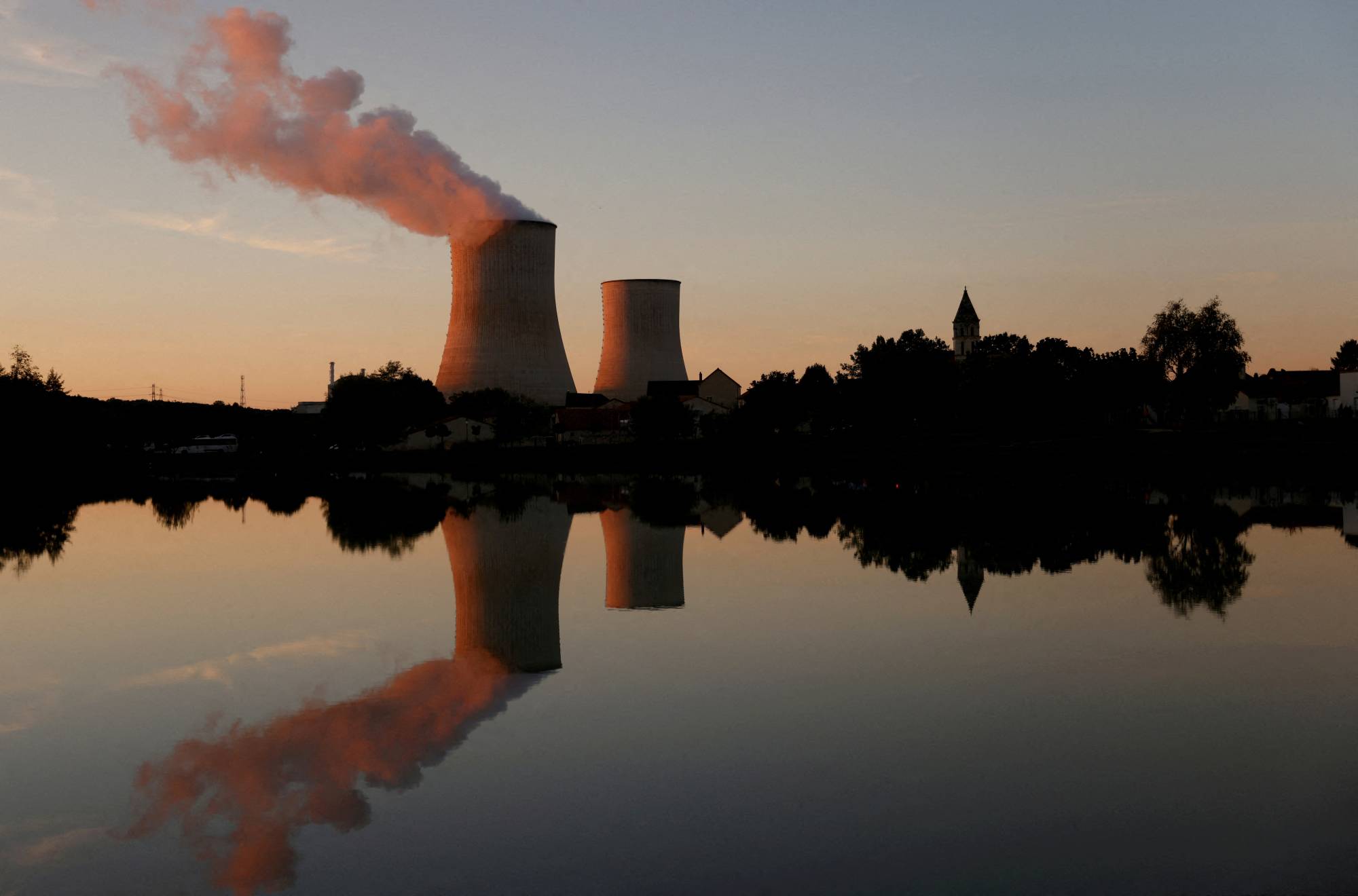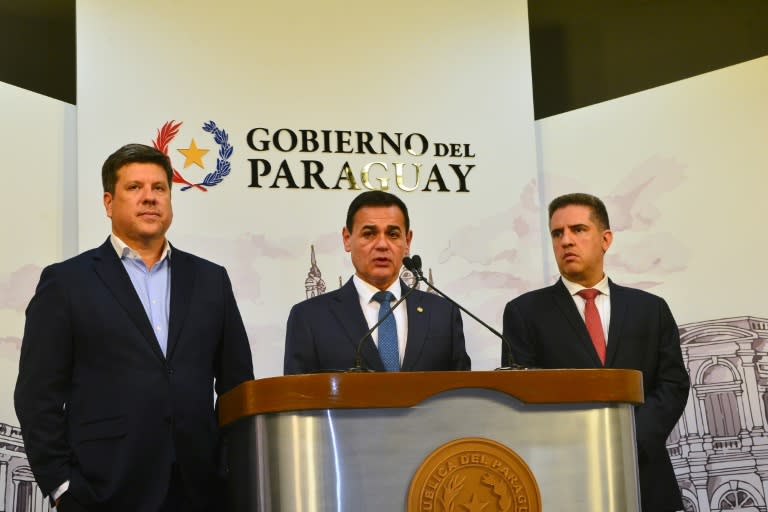International
Energy crisis pushes nuclear comeback worldwide

AFP
As the costs of importing energy soars worldwide and climate crises wreak havoc, interest in nuclear power is on the rise with nations scrambling to find alternative sources.
Investment in nuclear power declined after Japan’s 2011 Fukushima disaster, the world’s worst nuclear accident since Chernobyl in 1986, as fears over its safety increased and governments ran scared.
But following Moscow’s invasion of Ukraine in February, the subsequent squeeze on energy supplies and Europe’s push to wean itself off of Russian oil and gas, the tide is now turning back in favour of nuclear.
Governments face difficult decisions with rising gas and electricity bills and scarce resources threatening to cause widespread suffering this winter.
Some experts argue that nuclear power should not be considered an option, But others argue that, in the face of so many crises, it must remain part of the world’s energy mix.
One of the countries reconsidering nuclear energy is Japan, where the 2011 accident led to the suspension of many nuclear reactors over safety fears.
This week Japan’s Prime Minister Fumio Kishida called for a push to revive the country’s nuclear power industry, and build new atomic plants.
Other countries that were looking to move away from nuclear have discarded those plans — at least in the short term.
Less than a month after Russia’s attack on Ukraine, Belgium delayed by a decade its plan to scrap nuclear energy in 2025.
While nuclear power, currently used in 32 countries, supplies 10 percent of the world’s electricity production, the International Atomic Energy Agency (IAEA) raised its projections in September for the first time since the 2011 disaster.
The IAEA now expects installed capacity to double by 2050 under the most favourable scenario.
– Climate reasoning –
Even in Germany, Europe’s biggest economy, sticking with nuclear is no longer a taboo subject as the energy crisis rekindles debate on shutting down the country’s last three nuclear power plants by the end of 2022.
Berlin said last month it would await the outcome of a “stress test” of the national electric grid before deciding whether to stick with the phaseout.
Greenpeace Germany’s climate and energy expert, Gerald Neubauer, said turning to nuclear was “not a solution to the energy crisis”.
He said nuclear energy would have “limited” efficacy in replacing Russian gas since it is mainly “used for heating” in Germany not for electricity production.
“The reactors would only save the gas used for electricity, it would save less than one percent of the gas consumption,” he added.
But according to Nicolas Berghmans, energy and climate expert at the IDDRI think tank, extending the use of nuclear “can help”.
“Europe is in a very different energy situation, with several overlapping crises: the problem of Russian gas supply, the drought that has reduced the capacity of dams, the French nuclear plants’ weak output… so all the levers matter,” he said.
The pro-nuclear lobby says it is one of the world’s best options to avoid climate change since it does not directly emit carbon dioxide.
In fact, nuclear energy accounts for a bigger share of the world power mix in most of the scenarios put forward by the IPCC, the UN’s climate experts, to alleviate the global climate crisis.
– Divided opinions –
As the need for electricity booms, several countries have expressed a desire to develop nuclear infrastructure including China — which already has the largest number of reactors — as well as the Czech Republic, India and Poland since nuclear offers an alternative to coal.
Likewise, Britain, France and the Netherlands have similar ambitions, and even the United States where President Joe Biden’s investment plan encourages the sector’s development.
The IPCC experts recognise that the deployment of nuclear energy “can be constrained by societal preferences” since the subject still divides opinion because of the risk of catastrophic accidents and the still unresolved issue of how to dispose of radioactive waste safely.
Some countries, like New Zealand, oppose nuclear, and the issue has also been hotly debated in the European Union over whether it should be listed as a “green” energy.
Last month, the European Parliament approved a contentious proposal giving a sustainable finance label to investments in gas and nuclear power.
Other issues remain over nuclear infrastructure including the ability to build new reactors with costs and delays tightly controlled.
Berghmans pointed to “long construction delays”.
“We’re talking about medium-term solutions, which won’t resolve tensions in the market”, as they will arrive too late to address climate crises, he said, but suggested focusing on the “dynamic” renewable energies sector that can be immediately helpful.
International
Paraguay summons Brazilian ambassador over Itaipú espionage scandal

Paraguay summoned the Brazilian ambassador in Asunción on Tuesday to demand “explanations” and called its own representative in Brasília for consultations following Brazil’s acknowledgment of an espionage operation. The Brazilian government, led by President Luiz Inácio Lula da Silva, attributed the operation to the previous administration.
The surveillance effort aimed to uncover Paraguay’s position in now-suspended negotiations with Brazil regarding the pricing of electricity from the binational Itaipú hydroelectric plant, according to reports in the Brazilian press.
The Brazilian government “categorically denied any involvement in the intelligence operation,” stating in a Foreign Ministry communiqué on Monday that the espionage was carried out under former President Jair Bolsonaro’s administration (2019-2023).
“The operation was authorized by the previous government in June 2022 and was annulled by the interim director of the (state intelligence agency) ABIN on March 27, 2023, as soon as the current administration became aware of it,” Brazil’s government asserted.
Paraguay’s Foreign Minister Rubén Ramírez announced that Brazilian Ambassador José Antonio Marcondes de Carvalho was summoned “to provide detailed explanations” regarding the operation. Additionally, Paraguay recalled its diplomatic representative in Brasília “to report on aspects related to the intelligence activity conducted by Brazil regarding Paraguay’s government affairs.”
International
Elon Musk to step down as government advisor, per Trump insiders

President Donald Trump has informed his inner circle that Elon Musk will be stepping down from his role as a government advisor, according to a report by Politico today.
Citing three individuals close to Trump, Politico states that the president is pleased with Musk’s leadership at the Department of Government Efficiency (DOGE), where he has implemented significant budget cuts. However, both have agreed that it is time for Musk to return to his businesses and support Trump from a different position outside the government.
A senior administration official told Politico that Musk will likely maintain an informal advisory role and continue to be an occasional visitor to the White House. Another source warned that anyone thinking Musk will completely disappear from Trump’s circle is “deluding themselves.”
According to the sources, this transition is expected to coincide with the end of Musk’s tenure as a “special government employee,” a temporary status that exempts him from certain ethics and conflict-of-interest regulations. This 130-day period is set to expire in late May or early June.
International
Milei vows to make Argentina so strong that Falkland Islanders “choose” to join

Argentine President Javier Milei reaffirmed his country’s claim over the Falkland Islands (known as the Islas Malvinas in Argentina) and praised the role of the nation’s armed forces during a ceremony marking the “Veterans and Fallen Soldiers of the Malvinas War Day,” commemorating 43 years since the 1982 conflict with the United Kingdom.
Argentina continues to assert sovereignty over the islands, arguing that Britain unlawfully seized them in 1833.
“If sovereignty over the Malvinas is the issue, we have always made it clear that the most important vote is the one cast with one’s feet. We hope that one day, the Malvinas residents will choose to vote with their feet and join us,” Milei stated.
“That is why we aim to become a global power—so much so that they would prefer to be Argentine, making deterrence or persuasion unnecessary. This is why we have embarked on a path of liberation, working to make Argentina the freest country in the world and once again the nation with the highest GDP per capita on the planet,” he added.
-

 International4 days ago
International4 days agoSon of journalist José Rubén Zamora condemns father’s return to prison as “illegal”
-

 International4 days ago
International4 days agoMiyazaki’s style goes viral with AI but at what cost?
-

 Central America3 days ago
Central America3 days agoPanama police clarifies that Interpol alert for Martinelli is still pending
-

 Central America2 days ago
Central America2 days agoU.S. Homeland Security Secretary urges Mexico to strengthen Guatemala border
-

 International2 days ago
International2 days agoTrump urges Putin to reach peace deal
-

 Central America2 days ago
Central America2 days agoPanama grants Martinelli 72-hour extension to travel to Nicaragua
-

 International3 days ago
International3 days agoDeportation flight lands in Venezuela; government denies criminal gang links
-

 International14 hours ago
International14 hours agoParaguay summons Brazilian ambassador over Itaipú espionage scandal
-

 Sports14 hours ago
Sports14 hours agoFilipe Luis debuts as coach in Copa Libertadores with Flamengo
-

 Central America12 hours ago
Central America12 hours agoGuatemalan police officer killed in mob riots over baby kidnapping
-

 International14 hours ago
International14 hours agoMilei vows to make Argentina so strong that Falkland Islanders “choose” to join
-

 International14 hours ago
International14 hours agoICE agent’s arrest of suspect sparks controversy in Boston
-

 International14 hours ago
International14 hours agoElon Musk to step down as government advisor, per Trump insiders
-

 Sports14 hours ago
Sports14 hours agoVenezuela investigates 18 baseball players seeking asylum in Spain
-

 International14 hours ago
International14 hours agoÓscar Arias: Trump’s trade policies are a step backward















